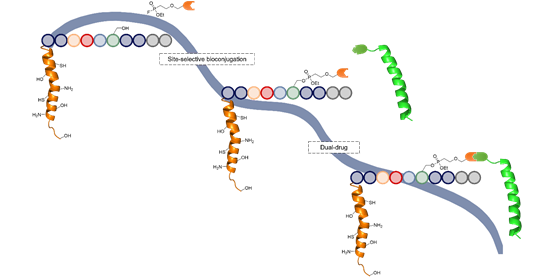Bioconjugation is a powerful tool for the introduction of diverse functionalities to biomolecules, enabling modulation of the properties. This is important for a wide array of applications, including targeted drug delivery and the study of cellular processes. However, site-selective bioconjugation remains challenging, especially when targeting one specific natural amino acid residue in a wild-type protein due to high abundance of each amino acid.
In this thesis two novel methods for sequence-specific, site-selective bioconjugation are investigated. A strategy was developed for the introduction of a handle to a large protein allowing for further functionalization. This novel conjugation strategy represents a new and powerful approach to site-selective bioconjugation, which could find widespread application in the field of chemistry and biology.
The developed bioconjugation strategy was used in the design of a dual-drug candidate for treatment of type 2 diabetes. Combination treatment, the co-administration of two or more drugs, has led to a substantial reduction in body weight compared to treatment with one drug alone. Novel dual-drugs therefore represent an attractive approach towards the development of novel treatments for obesity and obesity-related diabetes.
